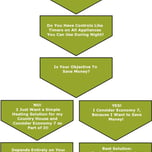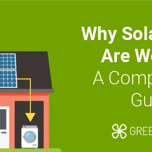Answer these simple questions and we will find you the BEST prices
Which type of solar quotes do you need?
It only takes 30 seconds
100% free with no obligation

Get up to 4 quotes by filling in only 1 quick form

Slash your energy bills by installing solar panels

For the average 2-3 bedroom house
- GreenMatch
- Blog
- How Many Solar Panels Do I Need?
How Many Solar Panels Do I Need in the UK? (October 2025)

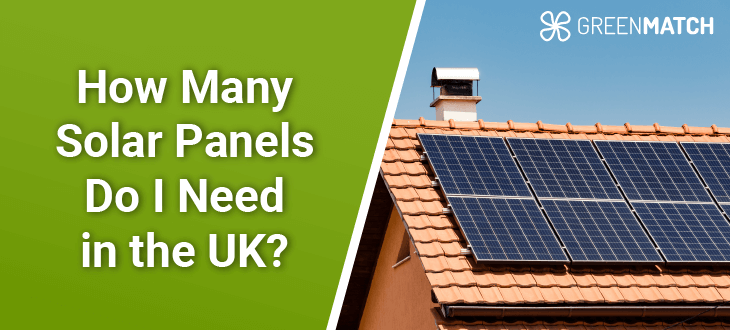
- The average home needs 8 to 13 panels for a 4kW system to cover its electricity needs (2,700kWh annually on average).
- A 2 bedroom house requires 4 to 8 panels, a 3 bedroom house needs between 8 and 13 panels, while a 4 or 5 bedroom household in the UK will need 13 to 16 solar panels, on average depending on household energy consumption and the wattage of the panels.
- Your electricity consumption, the direction of your roof, sunlight hours, and the roof space all determine the system size you need.
- 3 bedroom houses are the most common UK household size and will need 10 to 13 panels (350W) which will cost £6,600 - £8,100 on average.
Before installing solar panels for your home, you might ask “How many solar panels do I need?”. The answer depends on your home’s annual electricity consumption, the efficiency of your solar array, the number of sunlight hours at your location, and the size of your home.
We will go into more detail about how to account for each of these factors in your calculations throughout this article. The table below gives a basic rundown of the number of panels you might require per household size:
| Household Size | Average Annual Electricity Consumption | Estimated Number of Solar Panels (350W or 450W) |
|---|---|---|
| 1 - 2 bedrooms | 1,800kWh | 4 - 8 |
| 2 - 3 bedrooms | 2,700kWh | 8 - 13 |
| 4 - 5 bedrooms | 4,100kWh | 13 - 16 |
We recommend contacting an installer to determine how many solar panels you need. Finding a reliable one can be a daunting task that may take days of research on your own. That’s where our quick and easy service comes in handy, as we provide the best prices from installers we’ve personally vetted.
By clicking below, you can fill in our 30-second contact form and receive quotes from up to 4 free, non-binding quotes from professionals in your area.
- Quotes from local engineers
- Payment by finance available
- Save up to £1,567 per year
It only takes 30 seconds



- How many solar panels do I need?
- How to calculate how many solar panels you need?
- What factors influence the number of solar panels a home needs?
- Restrictions on how many solar panels you can have
- How many solar panels do you need for running a house off-grid?
- Solar panel costs & savings per solar system size
- FAQ
How many solar panels do I need?
On average, the number of solar panels you'll need for a 1-2 bedroom house is between 4 and 8 (2-3kW system), whereas you'll require about 8-13 panels (4-5kW system) for a 2-3 bedroom and 13 to 16 for a house with 4-5 bedrooms.
The table below gives a general estimate of how many solar panels you might need to offset your electricity use in the UK, but the exact number of panels will depend on several factors, including:
| House size | Solar system size | Annual energy consumption | Number of solar panels (350W) | Number of solar panels (450W) |
|---|---|---|---|---|
| 1-2 bedroom | 2-3kW | 1,800kWh | 5 - 8 | 4 - 6 |
| 2-3 bedrooms | 4-5kW | 2,700kWh | 10 - 13 | 8 - 10 |
| 4-5 bedrooms | 6kW | 4,100kWh | 16 | 13 |
- Your electricity consumption: To calculate the number of solar panels you need, first determine your annual electricity consumption in kilowatt-hours (kWh). An average UK household consumes about 2,900 kWh annually.
- The efficiency of your solar panels: Higher efficiency panels take up less space and need fewer cells to achieve the same output.
- Sunlight hours in your region: Not all regions have the same hours of sunlight per day.
- Roof size and orientation: South-facing roofs that allow for solar panels to achieve a 30° to 50° angle allow for better access to sunlight.
Solar panels' output varies by model but assumes an average production of 400 watts (W) per panel under optimal conditions, with a lower estimate of 350W and a higher estimate of 450W.
Therefore, to cover a medium-low consumption profile for 2-3 bedroom houses (1,800kWh/year), you'd need approximately 4 to 8 solar panels, depending on whether they are 350W or 450W. For medium usage (2,700kWh/year), 8 to 13 panels would suffice. Households with medium-high consumption (4,100kWh/year) should consider 13 to 16 panels.
Remember that these estimates are based on average conditions and actual needs may vary based on your location's sunlight exposure, the panels' efficiency, and your household’s energy consumption. As the number of residents increases, so do the energy consumption levels and solar panel sizes.
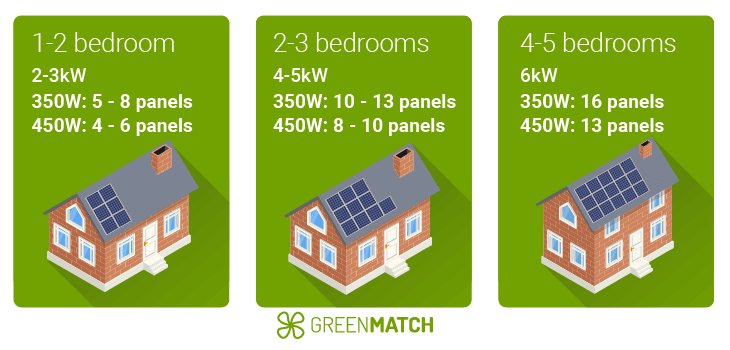
The average number of solar panels will also be determined by whether you would like your solar panels to generate all your electricity needs or only a percentage. The numbers above assume full electricity coverage.
How to calculate how many solar panels you need?
To calculate what solar system size you need, you should first know the amount of energy that you need to generate from your solar system daily. The other important things are the sun hours in your area and your roof space, as this can help you determine how many solar panels your roof can accommodate.
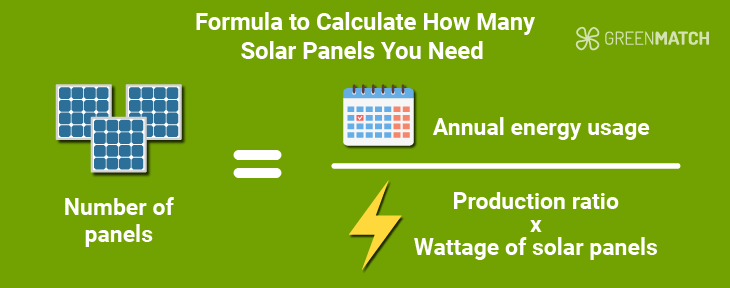
To find out how many you need to install on your roof, you should first check your monthly energy bills. Next, you will need to calculate the production ratio of your solar panels i.e., how much electricity your solar panel produces under the average sunlight and weather conditions in your area.
For the UK, the production ratio will be between 3.225Wh per day per Watt (W) on average. You can multiply this number by the Watts of solar panels. Consequently, for a 350 Watt panel, this would be 395.06kWh per day and 507.9kWh for 450W panels.
Finally, you should divide this number by the annual electricity usage, and it will show you how many solar panels you need. For the average 2 to 3 bedroom home this would be 2,700kWh consumed per day meaning that between 5 to 10 panels would be required on average.
It’s best to have more power than less, which is why you should round up the solar panels capacity for safety.
These can provide information on the amount of energy that you consume per day, and therefore how much energy you need your solar panels to generate daily. You can follow the same process to find the right commercial solar panel system size if you want to invest in solar PV for your business.
However, a roof is not the only option for installing solar panels. Ground-mounted arrays are another method of setting up your system. In the event of insufficient roof space can opt for garden solar panels if you have the space outside.
What factors influence the number of solar panels a home needs?
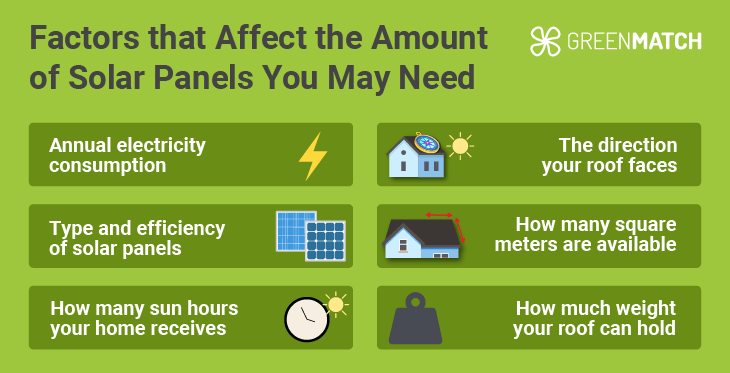
To determine the size of the panels that you need for your house, you need to know the following:
- Annual electricity consumption
- Type and efficiency of solar panels
- How many sun hours your home receives
- The direction your roof faces
Annual electricity consumption
Most 1 bedroom and smaller 2 bedroom homes use 1,800kWh per year. In contrast, most larger 2 bedroom homes and 3 bedroom homes use 2,700kWh, which is the average household consumption in the UK. Larger homes tend to use an average of 4,100kWh annually.
Type and efficiency of solar panels
Solar panels have variable efficiencies depending on the model or brand and the material they are made from.
Monocrystalline solar panels have the highest efficiency for domestic systems, tending to be between 15% to 24%, with experts listing the best solar panels as having above 20% efficiency at minimum.
Polycrystalline solar panels tend to have 13% to 16% efficiency while thin-film solar panels tend to have 7% to 13% efficiency. Polycrystalline panels tend to be the most common for domestic installations because of their superior performance.
Sun hours
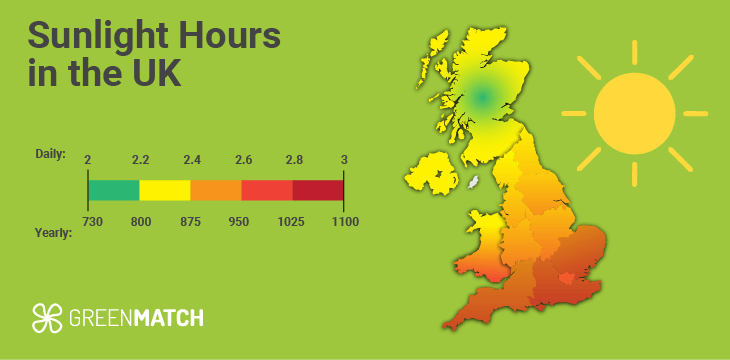
It is important to be aware that different regions in the UK have different sun hours per day: England has 4.1, Scotland has 3.7, Northern Ireland 3.2 and Wales 3.3.
This means that it could be more beneficial to install solar panels in Scotland, compared to solar panels in Northern Ireland. It is therefore important that you consult your local installer for guidance. This could result in bringing down the solar panel price in Wales, England, Scotland or Northern Ireland.
Solar panels generate different amounts of energy depending on their wattage size or rating. A 350 watt panel will generate up to 350W per sun hour while a 400W solar panel can generate up to 400W per sun hour (under ideal conditions).
The direction your roof face
South-facing roofs with a slight tilt towards the West perform the best in the UK. Countries such as Australia will require solar panels facing in the opposite direction. There are minute differences throughout the UK, but this rule generally applies throughout the region.
The optimum solar panel angle in the UK is between 30° to 50°. It is recommended to adjust the angles throughout the year to accommodate the changing position of the sun. Most roofs are perfectly suitable for solar panels unless they face North.
Similarly, flat roof solar panels are also an option when accompanied by ballasts. In fact, they can be easier to install and position at an ideal angle and orientation.
Restrictions on how many solar panels you can have
Certain factors can restrict how many solar panels your roof can hold.
- How much weight your roof can hold
- How many square meters are available
How much weight your roof can hold
Most roofs can easily manage 10kg per square meter, while the average weight load of a solar panel on a slanted roof is about 1.3kg per square meter (2.3kg per m2 on a flat roof). While they can weigh up to 18kg to 20kg, the force they exert per metre on a roof can be lower when installed with mounting.
Of course, this assumes this is a standard roof. Some can be weaker depending on the type of structure you’re installing panels on. Roof materials also play a role since materials like concrete tiles might need additional mounting and others like rubber or reflective materials may lower the efficiency of the solar panels.
How many square meters are available
How much space you have on your roof is also a major consideration. Solar panels are light enough to rest on roofs without any damage. That said, not every section of your roof may be facing the correct direction or allow for the right angle to make use of solar technologies.
This also relates to the size of solar panels, both in terms of capacity and their physical dimensions.
If you are installing 12 solar panels (350W), they would require a surface area of 24m². It is therefore important to know how much space you have. The table below outlines the average solar panel dimensions and weight per system size.
| System size | Number of solar panels | Household size | Space required |
|---|---|---|---|
| 2kW-3kW | 4 to 8 | Small; 1-2 bedrooms | 8m2 to 16m2 |
| 4kW-5kW | 8 to 13 | Medium; 2-3 bedrooms | 16m2 to 26m2 |
| 6kW | 13 to 16 | Large; 4-5 bedrooms | 26m2 to 32m2 |
When deciding how many solar panels you need, it can be difficult to account for all the factors involved. This is why it’s best to consult a reliable installer and have them provide you with an estimate. Finding a reliable installer can take days of difficult research and calling up companies. If that sounds like too much hassle, why not try out our handy hassle-free service?
We can easily provide you with up to 4 free non-binding solar panel quotes in the UK and all you have to do is fill out a 30-second form. Click the button below to get started.
- Quotes from local engineers
- Payment by finance available
- Save up to £1,567 per year
It only takes 30 seconds



How many solar panels do you need for running a house off-grid?
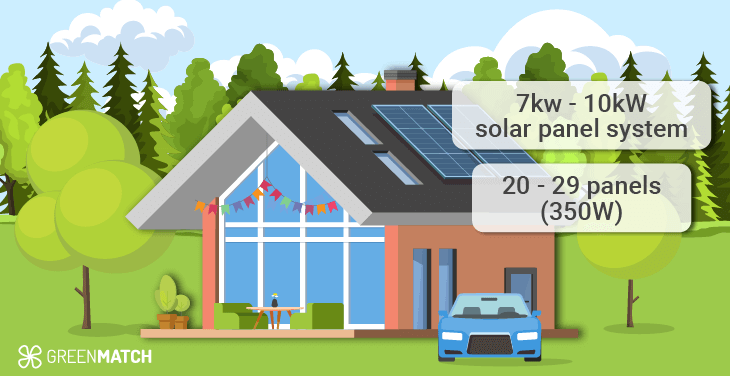
The average off-grid home will require a 7kW to 10kW solar panel system. Why so much compared to the modest 4kW system required for on-grid homes? Off-grid power has a lot more considerations.
Going off-grid usually requires a high-power system since you will often be compensating not just for electricity but also for gas. Therefore, the calculations are drastically different already. Added to this, you also need to compensate for the seasonal dips in energy generation during the winter.
These systems will cost between £14,700 - £18,000 and require between 38m2 to 54m2 of roof space, with more power needed since off-grid homes will need extra power. Similarly, off-grid living also requires a solar battery which may cost upwards of £8,000 on top of the solar panel costs if you want to use energy at night.
Solar panel costs & savings per solar system size
Price is also a factor in how many solar panels you can acquire. You can find an estimation of prices per solar panel system size in the table below:
| Solar panel size | Number of 350W Panels | Price | Break-even point (years) | Return on investment |
|---|---|---|---|---|
| 3kW | 8 | £5,700 - £7,000 | 7 | £13,000 - £15,000 |
| 4kW | 10 | £6,600 - £8,100 | 6 | £19,000 - £21,000 |
| 5kW | 13 | £8,300 - £10,200 | 6 | £24,000 - £26,000 |
| 6kW | 16 | £10,000 - £12,200 | 6 | £29,000 - £31,000 |
| 10kW | 29 | £12,300 - £15,000 | 9 | £18,000+ |
| 12kW | 35 | £14,700 - £18,000 | 7 | £18,000+ |
Cheap solar panels are also an option, but be cautious of extremely low prices. These panels are usually less efficient, have shorter warranties, or are more prone to performance issues. It's important to find a balance between affordability and quality. This way, you can fully enjoy the benefits of solar energy without breaking the bank. It's also helpful to consider how they might impact your property's resale value—specifically, do solar panels add value to your home? The answer to which is yes, solar panels add to your property's value by 6.2% to 6.8%.
However, the most accurate way to determine the cost of solar panels for your home is to find a reliable installer. Moreover, you should always get multiple quotes to ensure you are being given a fair price. This can be time-consuming and daunting with weeks passing before you find a single quote!
Luckily, GreenMatch can do the legwork for you! Fill in our short contact form and get up to 4 tailored quotes from suppliers in your area. The service is free and non-binding!
- Quotes from local engineers
- Payment by finance available
- Save up to £1,567 per year
It only takes 30 seconds



FAQ
To determine how many solar panels you need for your home, you will need to consider your energy requirements, the size of your roof, and the sun hours in your area. For the most accurate calculations, you need to consult a solar panel installer who can assess your home.
In the UK, you will need between a 7kW to 8kW system. This number is an estimate since there are many factors that can affect how many solar panels you need.
A 3 bedroom house roughly requires a 4kW solar panel system. However, this number is based on average energy consumption, which can vary for different households.
While this can depend on the size of your household, most 3-bedroom homes can be self-sufficient with 4kW systems.

As a writer with a deep understanding of low-carbon energy systems, Hannah aims to breakdown knowledge barriers and share insights to empower individuals in their pursuit of creating more environmentally conscious homes.

We strive to connect our customers with the right product and supplier. Would you like to be part of GreenMatch?

- How many solar panels do I need?
- How to calculate how many solar panels you need?
- What factors influence the number of solar panels a home needs?
- Restrictions on how many solar panels you can have
- How many solar panels do you need for running a house off-grid?
- Solar panel costs & savings per solar system size
- FAQ
- Quotes from local engineers
- Payment by finance available
- Save up to £1,567 per year
It only takes 30 seconds





